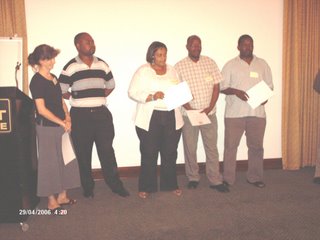NOMSTE from Limpompo took four awards during the first ever ASESA Science Expo and Olympiads National Finals held at the Esplanade Hotel in East London on Saturday, September 02, 2006.
Mahlaguame Dinkwanyane came first in the Design, Technology and Engineering category, and Johannah Masemola took the second spot in the Physical and Chemical Sciences, Astronomy category. Their projects were
Mecha-twist and
Comet respectively. They both came from the Glen Cowie Secondary. Kabelo Madihlaba from Bopedi Bapedi High School came second in the Biology, Earth, Medical and Environmental Sciences category. NOMSTE's Chidi Melvinia, also from Glen Cowie Secondary took top honours in Maths Olympiad with 70%.
MDAMSTEDA, KWTDAMSTE and PIMSTA managed their first spots through Yonela July, Zanele Nakase and Sithembile Zungu resepectively. July won the Biology, Earth, Medical and Environmental Sciences category, and Nakase the Physical and Chemical Sciences, Astronomy category whilst Zungu had a walk-over as she was the sole candidate in the Indigenous Knowledge category. Titles of their projects were
Water Purification,
Omega 3000 and
Incence respectively.
Each ASESA member-association came with six learners, accompanied by a teacher. Four were to participate in each category of the science expo, and two for the Maths and Science Olympiads.
The president of ASESA, Mbambeni Ndaba told the participants that their projects displayed here are geared at improving and prolonging our lives. “These are challenges facing South Africa. With projects like these, we are moving in the right direction,” Ndaba said.
Learners were welcomed by Councillor Mtobele Mtongana from the Amathole District Municipality. He told the gathering that he was impressed by projects such as those of Yonela July from Sandisiwe High School in Mdantsane that deals with water purification.
“Clean water is very important to every municipality,” he said.
Speaking on behalf of the judges that included educators and Kwezi Mpuhlu (civil engineer), Barbara Valentine, a researcher at ITEC said that they were delighted and thrilled by the work they have seen.
“It was not easy to reach a final decision, and we had to have a consensus,” Valentine said. The judges looked for a thorough sound understanding of science, innovative, creativity and the usefulness of the project to benefit the human kind.
Valentine advised the learners to know exactly what the criteria are, well before hand. “Projects are a collection of well researched information. Make journals and portfolios where you will show background information and literature review,” she said. Giving credit were it is due is very important. She pleaded with the learners to avoid plagiarism. “Be careful, do not copy from the books, use your own words.”
The East London District Director, M Ngwanya delivered the address of the day. He told the learners to believe in themselves. “Tell yourselves that you are the hope of the country, you are the future, and that you will make a difference,” Ngwanya said.
Fanyana Mazibuko from the Trust for Educational Advancement in South Africa (TEASA) could not contain himself. “I am addicted to see learners succeeding in Maths, Science, Technology and Commerce,” he said. “You are the producers of many things whilst the latter are the distributors of those equities.”
ASESA Programmes Coordinator, Siyabulela Matshayana encouraged these learners to start science clubs at their schools. “Science clubs must be run by learners. Educators must only give directions,” he said. Matshayana also motivated girls to increase their entries to more than 60%. “ASESA science expo is targeting disadvantaged communities mainly, like our schools, but you also need to enter for other expos like the Eskom Expo for Young Scientists and many international expos such as the one to be held in Durban in 2007,” he said.
Lipuo Morolong from TEASA awarded the first and second placed winners in the different categories with trophies. Four categories were contested. There is still a great lack of participation in the Indigenous Knowledge as only one learner participated uncontested. Learners also performed poorly in Science, with the highest score being 45% as compared to the highest score of 70% in Maths.
According to Archie Dlulisa who led the group that was overseeing the Olympiads, learners took things for granted and only took 30 minutes to answer a 90 minutes paper. MASTEDAM's Bouwer Roland from Brent Park Secondary and KWTDAMSTE's James Motlalepula topped the scores with a mere 45%.
“Learners need to focus on each question, think about it and get a clear and better understanding instead of taking it for granted,” Dlulisa said.
The next ASESA Expo and Olympiad will be in 2007. Date and venue will be announced in due course.
For more news and information on ASESA, please visit:
http://asesa.blogspot.com/ and
http://www.asesa.org.za/

 Over 60 educators will be descending at Osner Hotel in East London for a two-day workshop as from the Freedom Day. These educators come as far as Limpompo and KwaZulu-Natal. They form part of ASESA delegation and will be joining their counterparts from around East London and KingWilliam’s Town.
Over 60 educators will be descending at Osner Hotel in East London for a two-day workshop as from the Freedom Day. These educators come as far as Limpompo and KwaZulu-Natal. They form part of ASESA delegation and will be joining their counterparts from around East London and KingWilliam’s Town.
